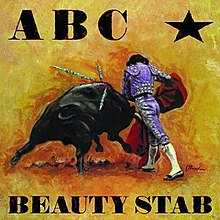Beauty Stab
| Beauty Stab | ||||
|---|---|---|---|---|
 |
||||
| Studio album by ABC | ||||
| Released | 14 November 1983 | |||
| Recorded | August–September 1983 | |||
| Studio |
Various
|
|||
| Genre | ||||
| Length | 42:58 | |||
| Label | Neutron (UK) Mercury (US) Vertigo (Canada and Europe) |
|||
| Producer |
|
|||
| ABC chronology | ||||
|
||||
| Singles from Beauty Stab | ||||
|
||||
| Professional ratings | |
|---|---|
| Review scores | |
| Source | Rating |
| AllMusic | |
| Smash Hits | |
| Robert Christgau | A− |
Beauty Stab is the second studio album by English new wave band ABC. It was originally released in November 1983, on the labels Neutron, Mercury and Vertigo. The album was recorded over a period of three months between August and September 1983, in sessions that took place at Sarm Studios East and West, Townhouse Studios and Abbey Road Studios. It was a departure from the stylised production of the band's debut album, The Lexicon of Love and featured a more guitar-oriented sound.
The album was produced by ABC with Gary Langan, who was the audio engineer on the band's first album. The band employed the rhythm section of Andy Newmark (drums) and Alan Spenner (bass guitar) both of whom had recently recorded and toured with Roxy Music at the time. The cover photography was by Gered Mankowitz.
On release, the album was received negatively by the majority of music critics. In a 1995 article, music journalist Simon Reynolds listed Beauty Stab among "the great career-sabotage LPs in pop history". In retrospect, the band members themselves have been quite vocal in that they were less satisfied with the album with founding member Stephen Singleton leaving the band soon after promotion for the album was completed. Martin Fry later stated that "we were eager to go in a totally different direction [to The Lexicon of Love]. We didn't want to do a sequel. In retrospect, perhaps that is exactly what we should have done". The album was certified Gold by the BPI for shipments in excess of 100,000 copies, but was not as commercially successful as its predecessor. It peaked at No. 12 on the UK Albums Chart and spawned only two Top 40 singles (neither of which made the Top 10).
...
Wikipedia
